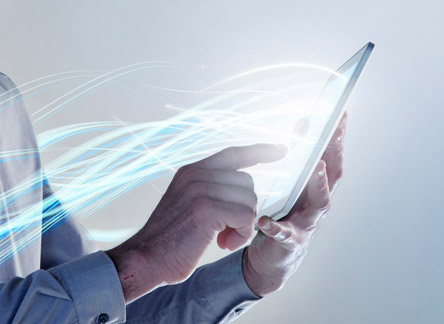- KDDI HOME
 Corporate Information
Corporate Information  Sustainability
Sustainability  Environment
Environment
Environment
KDDI's Approach (Environment)
Our attitude toward environmental conservation is defined in the KDDI Environmental Charter with the approval of the President. Here, the Manifesto (Approach to Global Environmental Problems), which is the highest-level concept, and the Action Guidelines to direct our concrete initiatives have been established.
In response to climate change, which is an important issue for the entire planet, we have declared that we will achieve carbon neutrality [1] by fiscal 2030. We will work to achieve net-zero CO2 emissions by reducing power consumption at base stations, utilizing renewable energy, and other measures.
In addition, to raise ecological awareness, we promote employee understanding of the impact of our business activities on the environment through training and other internal awareness programs, and we seek to resolve environmental issues through communication with internal and external stakeholders.
As a global company, KDDI is committed to steadily reducing the environmental impact of all its business activities.
- [1]Scope 1, Scope 2 (KDDI non-consolidated)
The KDDI GREEN PLAN - A medium- and long-term environmental conservation plan

KDDI is currently promoting its environmental conservation plan, the KDDI GREEN PLAN. Positioning harmony with the environment as one of our management philosophies, we have been working on key issues, namely to bring about a decarbonized society, to form a circular economy, and to conserve biodiversity. Furthermore, to raise our corporate value in the medium and long term, we are setting new targets to mitigate and reduce risks and to create business opportunities, aiming to further improve environmental value and invigorate our activities.
| Reducing risks | Creating business opportunities | |
|---|---|---|
| Decarbonized society |
|
|
| Circular Economy |
|
|
| Biodiversity |
|
|
See below for the details and initiatives of the targets
The KDDI Group aims to achieve carbon neutrality CO2 emissions for Scopes 1 and 2 of the entire KDDI Group by fiscal 2030
| Scope 1KDDI Group Approximately 2% of its CO2 emissions |
Details | In-house power generation at communication facilities, fuel consumption by cable-laying vessels, thermal power generation | |
|---|---|---|---|
| Methods | Offsetting being planned by quality-guaranteed carbon credits (absorbing and removing types (carbon-absorbing and removal origin)) | ||
| Scope 2KDDI Group Approximately 98% of its CO2 emissions |
Details | Electricity comprises approximately 99% of the energy used by communication facilities (of which stations, and station buildings and datacenters account for 50% each), and approximately 1% is from heat and steam | |
| Methods | Power |
All Telehouse-brand datacenters around the world will aim to switch to net-100% renewable energy by the end of fiscal 2025, by the means above [4]. |
|
| Heat and steam | Offsetting being planned by switching to electricity and turning to quality-guaranteeing certificates and carbon credits (absorbing and removing types (carbon-absorbing and removal origin)) | ||
| Scope 3 | Details | Approximately 95% falls into Category 1 (purchase of services and products) and Category 2 (capital goods) | |
| Methods | Request and support initiatives aimed at visualizing and reducing CO2 emissions for business partners (sharing knowledge on CO2 emission reduction through dialogues, providing guidebooks, and similar methods) | ||
-
[3]Abbreviations
- PPA: Power Purchase Agreement. A system where PPC business operators build solar power generation facilities on idle land and the like owned by parties needing electricity, providing renewable energy
- RE100: Renewable Energy 100%. An international initiative aimed at procuring energy used in business activities completely from renewable energy sources
- FIT: Feed-in-tariff system. A system that mandates electricity companies to purchase the electricity produced by solar power and wind power facilities at the prices specified by the state
- I-REC: International Renewable Energy Certificate. One of the renewable energy certificates overseas
-
[4]Targets at datacenters
- The Telehouse datacenters covered by these targets refer to the datacenters whose buildings and facilities are owned by the KDDI Group. Excluded are the types where the KDDI Group borrows part of other companies' datacenters as facilities to provide services.
- These targets do not include communication station buildings for company businesses, resale of other companies' services, and datacenters not included in consolidated financial statements. Communication station buildings for company businesses aim to achieve carbon neutrality CO2 emissions by fiscal 2030 (Scopes 1+2.)
- Under Scope 2, the plan is to switch to using 100% of electricity from renewable sources by fiscal 2025, and for heat and steam sources to achieve carbon neutrality CO2 emissions by fiscal 2030 together with Scope 1.
- Telehouse customers who procure their own environmental values may be excluded from the coverage.
- Datacenters that are scheduled for closure are not covered by these targets.
Obtained SBT Certification, an International Initiative for Climate Change

In February 2022, the KDDI Group obtained SBT certification under the international Science-Based Targets initiative (SBTi). In addition to the CO2 emissions reduction targets set by KDDI on a non-consolidated basis (in Japan), the KDDI Group as a whole will further promote measures to address climate change by setting new targets. To reduce CO2 emissions, we will promote energy efficiency and shift to renewable energy for cell phone base stations and telecommunications equipment.
KDDI's effort to conserve environment
As the KDDI Group benefits greatly from the natural environment, we believe it is important to promote activities to address environmental issues. In order to pass on our irreplaceable earth to the next generation, KDDI Group employees are engaged in various activities to preserve the global environment in cooperation with various stakeholders, including local residents, governments, universities, NGOs and NPOs.
- Sustainability
-
- Environment
- Society
- Governance
- Mid-Term Sustainability Targets
- President's Message
- KDDI's Commitment to Sustainability
- KDDI's SDGs
- Integrated Sustainability and Financial Report
- ESG data
- Compliance
- Community Cooperation (in Japanese only)
- Social Contribution Activities
- Sustainability News (in Japanese only)
- External Recognition/Initiatives
- Recommended Contents
-


